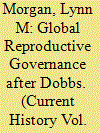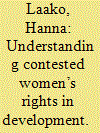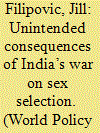| Srl | Item |
| 1 |
ID:
120791


|
|
|
|
|
| Publication |
2013.
|
| Summary/Abstract |
HIV sensitisation campaigns often aim to empower people living with HIV or AIDS (PLWHA) to enable them to cope with their illness by getting on with normal life as best as they can. However, contained within these messages are implicit assumptions about the needs of PLWHA. This research found that in Jamaica PLWHA's reproductive health needs are considered to be met largely by condoms. However, PLWHA respondents in this study expressed desires to have children and felt that their right to this was being denied. As such, dominant HIV sensitisation messages fail to respond to Jamaican PLWHA's own perceptions of their needs. This information is of importance, as the focus of the international HIV response moves away from simply preventing new infections to supporting those who have already been infected through locally appropriate interventions. As part of this, local perceptions need to be acknowledged 'up-stream' in HIV programming.
|
|
|
|
|
|
|
|
|
|
|
|
|
|
|
|
| 2 |
ID:
189697


|
|
|
|
|
| Summary/Abstract |
The 2022 US Supreme Court decision Dobbs v. Jackson Women’s Health overturned the constitutional right to abortion, raising questions about the international implications of the ruling. The Dobbs decision reveals a growing rift in global reproductive governance between countries that rely on international human rights standards and those that do not. The global momentum is currently with the human rights contingent, but the Dobbs ruling reflects the logic of a global antiabortion coalition that would like each country to decide its own life and family laws, without interference from multilateral agencies, based on its own constitution, history, and traditions.
|
|
|
|
|
|
|
|
|
|
|
|
|
|
|
|
| 3 |
ID:
151502


|
|
|
|
|
| Summary/Abstract |
This article builds on the recent debates on human rights and development to discuss the case of reproductive rights and midwifery activism as part of the broader mobilisation for the humanisation of birth and against obstetric violence in Latin America and Mexico. Drawing on extensive fieldwork, the analysis shows how human rights continue to form a significant contentious and constructed terrain among women in the global South. The mobilisation for the humanisation of birth and against obstetric violence indicates how the clinical developmental view of reproductive rights is challenged by these activists as not necessarily safeguarding the rights of women during birth. In Mexico this campaign is essentially linked to the struggle to bring back and strengthen midwifery as a way of ensuring improved human rights in birth. The article concludes, however, that this campaign might be challenged by Indigenous rights in the near future.
|
|
|
|
|
|
|
|
|
|
|
|
|
|
|
|
| 4 |
ID:
144413


|
|
|
|
|
| Summary/Abstract |
India’s ban on sex-selective abortions in 1994 was designed to increase gender equality and send the message that girls and women are valued in society. But the law has also come at a cost, according to Jill Filipovic. Many poor women now find that they can’t access second-trimester abortions at all. The policy’s implementation raises a crucial question: “Can you promote the rights of women and girls and also restrict their family choices?”
|
|
|
|
|
|
|
|
|
|
|
|
|
|
|
|